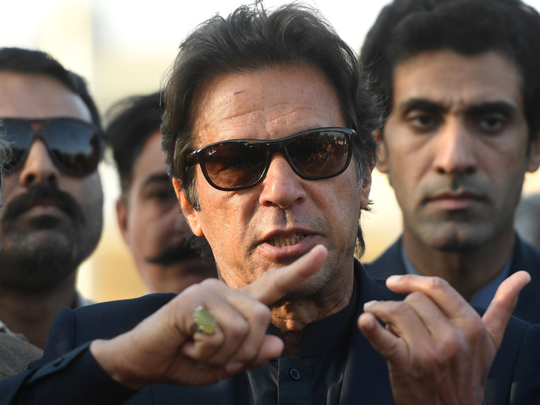
Friday’s Pakistan Supreme Court verdict in Islamabad not only vindicated Imran Khan, following a long-drawn trial based on allegations that the former cricket star-turned-politician had illegitimately received huge funds from overseas.
More importantly, it also finally ended an unwelcome phase marked by squabblings between Pakistan’s two main political protagonists. The verdict has now laid the road for settling scores away from courts and in the political arena.
The charges against Imran came from no less than Hanif Abbasi, a senior leader of the Pakistan Muslim League-Nawaz (PML-N). Needless to add that the PML-N has been very badly stung after the July 28 departure of their leader Nawaz Sharif, the former prime minister, in a Supreme Court verdict over a case that was initiated by Imran.
Sharif was forced out following a long-drawn trial prompted by the discovery of massive wealth belonging to his three children, revealed in the so called ‘Panama leaks’ global investigation.
And while Sharif continues to go from one public forum to another, asking the question — ‘mujhey kiyun nikala’ (why was I forced out), his ability to withstand the test that he faces remains weak at best. The PML-N’s unsuccessful push to force Imran’s disqualification by the Supreme Court, was essentially driven by a very clear intent to settle scores with Imran.
The push by Sharif’s party was incredibly flawed from day one. To begin with, Sharif faced an overwhelming challenge in coming clean unlike Imran. The chance discovery of his children’s luxurious assets in the ‘Panama leaks’ investigation, effectively sealed Sharif’s fate right from the beginning. The Panama discovery at a location that is almost 10,000 miles away from Pakistan, made it impossible for Sharif and his cronies to convincingly argue that the former prime minister’s departure from office was the consequence of a sinister conspiracy.
Though some of Sharif’s cronies have stretched the limit of their imagination, arguing that his departure was the consequence of the former prime minister’s zealous pursuit of an ambitious Chinese plan to undertake large-scale investments in Pakistan, nothing could be further from the truth. Sharif lost office because he simply failed to convince the apex court that his background was clean.
Though disqualified for life from holding any public office, Sharif continues to question the Supreme Court’s verdict against him. Meanwhile, Imran’s legal victory on Friday served to underline two equally vital lessons.
First, beyond the court’s proceedings, the upcoming battle in Pakistani politics, with general elections due in 2018, will be settled in the political arena. The lesson for the future for politicians must therefore now take them to focus squarely on the political arena where Pakistanis face plenty of gigantic challenges that surround them in their daily lives.
Though Sharif remains disqualified from returning to any political office in the future, he nevertheless heads the Pakistan Muslim League-Nawaz (PML-N), which presently in power at the Centre and in the state of Punjab — the largest province in Pakistan. With or without holding charge as the prime minister, Sharif cannot remain detached from the future of Pakistan’s politics where many will judge his party during the next elections through its ability to tackle key challenges rather than the former prime minister’s real or imaginary political fate.
Second, Imran deserves major credit for his record in public welfare — notably, his brave campaign that led to the establishment of the Shaukat Khanum Memorial Cancer Hospital in Lahore. Built in the memory of his late mother who died of cancer. The facility marked the first time ever that a dedicated cancer hospital was established in Pakistan. In sharp contrast, none of Pakistan’s other mainstream politicians have such an unprecedented facility to their credit. The Lahore cancer hospital led to a similar facility in Peshawar and another hospital is coming up in Karachi, as the ‘Shaukat Khanum’ brand name extends its presence across Pakistan.
But one of the most potent aspects of Imran’s politics is essentially the brand name he carries. He entered politics almost two decades ago with the creation of the ‘Pakistan Tehreek-e-Insaaf’ or PTI political party. During this time, he appears to have touched the imagination of many ordinary Pakistanis, stung by injustices almost on a daily basis. Ranging from being exploited in government offices to being ripped off by unscrupulous private businesses, many ordinary Pakistanis have found themselves short-changed.
Though the PTI is widely seen as the third main political force in the country after the PML-N and the Pakistan People’s Party (PPP), led by former president Asif Ali Zardari, Imran’s message, nevertheless, presents a breath of fresh air. To his critics, Khan and PTI still represent more of a vision than any tangible change even on their home turf — the northern Khyber-Pakhtunkhwa Province, ruled by the party. Yet, Friday’s verdict, coming just months after Sharif’s disqualification, clearly gives an upper hand to Imran.
Going forward, it’s far from clear if the PTI, under Imran’s leadership, will manage to gain substantial political ground in next years’ parliamentary elections, but what is abundantly clear is that the message presented by Imran is fundamentally new in a country where ordinary citizens have enough reasons to be frustrated with mainstream political parties and their leaders who have failed to deliver. Irrespective of how PTI’s political fortunes shape up in the days ahead, at least for now, there is no denying the fact that it has gained some additional momentum with the Supreme Court ruling in favour of its leader.
Farhan Bokhari is a Pakistan-based commentator who writes on political and economic matters.









